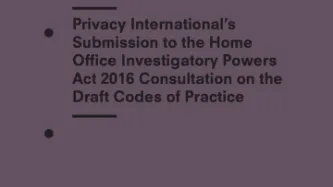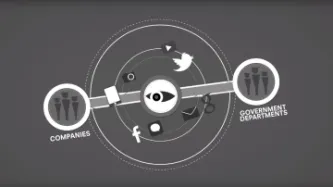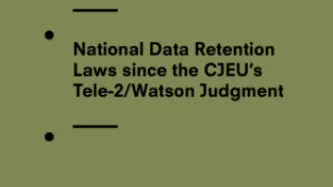Search
Content type: Press release
We found this image here.
The National Police Chiefs’ Council (NPCC) will no longer be able to operate in secret after human rights campaign organisations Liberty and Privacy International demanded it be subject to Freedom of Information laws.
The Government has now informed the organisations that it has started a process to designate the law enforcement policy-making body as a public authority subject to the Freedom of Information Act (FOIA) – meaning it will be open to public scrutiny.…
Content type: Press release
We found this image here
The Investigatory Powers Tribunal (IPT) today held that, for a sustained period, successive Foreign Secretaries wrongly gave GCHQ unfettered discretion to collect vast quantities of personal customer information from telecommunications companies.
The judgment exposes:
· the error-ridden and inconsistent evidence provided by GCHQ throughout the case;
· the willingness of telecommunications companies to secretly hand over customer data on the basis of mere verbal…
Content type: Long Read
How would you feel if you were fingerprinted by the police before you were allowed to take part in a peaceful public demonstration?
As tens of thousands of people attend massive public demonstrations across the UK today against US President Donald Trump in a ‘Carnival of Resistance’, it’s a question worth asking. Why? Because the police now deploy a range of highly sophisticated surveillance tools at public events which are just as if not more intrusive. And these technologies should be even…
Content type: News & Analysis
In order to uphold the law and keep us safe, the police can seriously interfere with a range of fundamental human rights. And so transparency and public scrutiny of their actions are essential to protect against misconduct and abuse.
So why is the National Police Chiefs’ Council (NPCC) now permitted to operate in secret?
We all have the right to seek information from most public bodies – including the police – under the Freedom of Information Act (FOIA) 2000. When the law was first…
Content type: News & Analysis
While the worlds’ attention, the world’s humour, including a dedicated playlist of 89 songs on Spotify, were on the coming into force of EU’s General Data Protection Regulation (GDPR) on 25th May, the UK’s Data Protection Act 2018 (DPA 2018) that received Royal Assent only two days previously had barely received a few column inches in the mainstream press.
However, the substance of the debates in parliament during the passage of this Act has received wide…
Content type: Press release
Privacy International (PI) has today urged England Manager Gareth Southgate to bolster his defence ahead of the World Cup in Russia, which kicks off next Thursday. PI sent Southgate an anti-surveillance 'Faraday cage' phone pouch and a briefing on his vulnerability to potential spying by rival football managers and foreign governments intent on giving their team a competitive advantage. If rival governments routinely hack and intercept each other's communications, what's stopping rival teams'…
Content type: Press release
On the five year anniversary of NSA whistleblower Edward Snowden leaking a massive trove of classified information that has since transformed our understanding of government mass surveillance, Dr Gus Hosein, Executive Director of Privacy International said:
“Is it enough for your government to tell you ‘we’re keeping you safe, but we’re not going to tell you how’? Edward Snowden asked himself this profoundly important question five years ago. We’re thankful he did.
His decision to expose the…
Content type: Press release
In a remarkable development in Privacy International's four year legal battle against the UK Government's powers to hack phones and computers on a massive scale, the UK Supreme Court has agreed to hear the London-based charity's case in December 2018.
Privacy International's case stems from a decision by the Investigatory Powers Tribunal (a specialised court set up to hear complaints against government surveillance, including surveillance carried out by the UK intelligence agencies) finding…
Content type: Press release
Privacy International (PI) has today sent a detailed report and list of questions to the UK Prime Minister, Theresa May, following her admission that failures in the UK system governing intelligence sharing with international partners helped facilitate the detention, retention and “appalling treatment” of Abdel Hakim Belhaj and Fatima Boudchar.
Yesterday, in a letter written to Belhaj and Boudchar and read out in the UK parliament, Prime Minister May made the extraordinary admission that “The…
Content type: Advocacy
A new Privacy International report based on an international collaborative investigation carried out by 40 NGOs in 42 countries has found alarming weaknesses in the oversight arrangements that are supposed to govern the sharing of intelligence between state intelligence agencies, including in the UK. Privacy International urges governments to enact urgent reforms and improve public understanding about the scope of intelligence sharing and the safeguards and oversight currently in place.
Content type: News & Analysis
This op-ed originally appeared in the Huffington Post.
As technologies used by the police race ahead of outdated legislation, we are left vulnerable to potential for misuse and abuse of our data
The vast quantities of data we generate every minute of the day and how it can be exploited is challenging democratic and societal norms. The use by UK police forces of technologies that provide access to data on our phones, which document everything we do, everywhere we go, everyone we interact with…
Content type: Long Read
In December 2017, Privacy International published an investigation into the use of data and microtargeting during the 2017 Kenyan elections. Cambridge Analytica was one of the companies that featured as part of our investigation.
Due to the recent reporting on Cambridge Analytica and Facebook, we have seen renewed interest in this issue and our investigation. Recently in March of 2018, Channel 4 News featured a report on micro targeting during the 2017 Kenyan Presidential Elections, and the…
Content type: Long Read
Image: Eric Jones
The UK government last week hosted hundreds of surveillance companies as it continues to try and identify “technology-based solutions” able to reconcile the need for controls at the Irish border with the need to avoid them.
The annual showcase conference of 'Security and Policing' brings together some of the most advanced security equipment with government agencies from around the world. It is off limits to the public and media.
This year’s event came as EU and UK…
Content type: News & Analysis
Written by Privacy International
08:27: Jen gets on the London Underground to go to work. She uses her contactless debit card to pay for the tube, so Transport for London knows where she is travelling to and from and her bank knows when she takes the tube.
08:36: The public WiFi on the tube means that even when Jen doesn’t connect to it, her every step inside the underground is tracked. The data will eventually be sold to advertisers.
08:58: Jen arrives at work. As with all the lower…
Content type: Press release
Hearing: Cross examination of senior GCHQ official about Intelligence Agencies’ use of massive databases of information about everyone in the UK
When: Monday 26 February 2018, 3.15pm
Where: Royal Courts of Justice, Court 28, Strand, London WC2A 2LL
Summary
This is the first time GCHQ have given open evidence in the Investigatory Powers Tribunal (The Tribunal). It is also the first time they will be cross examined by Privacy International on serious misleading errors they provided in…
Content type: Press release
Privacy International and Open Rights Group have submitted a response to the Consultation on establishing a UK Privacy and Civil Liberties Board.
Content type: Press release
Privacy International today received an email from Saul Olivares, Sales and Marketing Director of Creativity Software, in response to the letter we sent to Creativity CEO Richard Lee yesterday.
Mr Olivares directed PI to an attached statement, in which Creativity stated that it was:
…proud to be a supplier of world class technology to MTN, in Iran and other countries. MTN is a company with the vision of being the leading telecommunications provider in emerging markets, with an avowed mission…
Content type: Press release
The Case
Privacy International v Secretary of State for Foreign and Commonwealth Affairs et al. (Bulk Personal Datasets & Bulk Communications Data challenge)
Date: 5-9 June 2017
Time: from 10:00 onwards
Location: Royal Courts of Justice, The Strand, London WC2A 2LL United Kingdom
Hearing overview
Next week’s hearing follows the Investigatory Powers Tribunal’s earlier judgment in October 2016, which ruled that three issues are to be determined:
…
Content type: News & Analysis
The recent announcement by the Minister for Justice that serious and organised crime will receive legislative attention from the Government and the Oireachtas is most welcome. However, the stated means of achieving this are deeply concerning for the Irish public and larger digital economy. The statements indicate that the Government intends to follow the British model of surveillance where Irish companies can be compelled to betray their users. Why would any user engage with a…
Content type: News & Analysis
This post was written by Chair Emeritus of PI’s Board of Trustees, Anna Fielder.
The UK Data Protection Bill is currently making its way through the genteel debates of the House of Lords. We at Privacy International welcome its stated intent to provide a holistic regime for the protection of personal information and to set the “gold standard on data protection”. To make that promise a reality, one of the commitments in this government’s ‘statement of intent’ was to enhance…
Content type: Advocacy
The powers set out in the Investigatory Powers Act are wide ranging, opaque and lacking in adequate safeguards. The Government have now published updated Draft Codes of Practice for certain parts of the Act. Unfortunately, the Codes do little to solve the Act’s problems. Instead, they add little transparency, occasionally expand powers, and undermine some of the limited safeguards in the Investigatory Powers Act. These Codes demand close scrutiny. The unusually short timeframe for…
Content type: News & Analysis
The following appeared in the Daily Telegraph, and was written by Carly Nyst, Legal Director of Privacy International:
"Robert Hannigan, the new head of GCHQ, announced his arrival this week with a call for “greater co-operation” with security forces by tech companies. Hannigan’s article in the Financial Times illustrated vividly the destructive ideology that has driven the infiltration by the British and American intelligence agencies into every aspects of the digital realm – an…
Content type: News & Analysis
The elections in our midst here, there, and everywhere are increasingly resulting in governments who introduce policies that result in leaps backwards for dignity, equality, civil liberties, and the rule of law. Whether it is Poland or the Philippines, governments are overriding essential safeguards.
This week Britain’s proposed surveillance legislation took another step toward normalising mass surveillance. The United States of America has long promoted mass surveillance and maintains its…
Content type: News & Analysis
This piece originally appeared in Open Democracy here.
As the UK Parliament returns from its summer break, everyone’s back to talking about Brexit. But there’s another policy of existential significance to our democracy that we really need to be talking about. I refer here to the innocuously named ‘Investigatory Powers Bill’. The House of Lords have been debating the ‘bulk powers’ — what we would call the mass surveillance measures — of the Bill over the recent days. We are literally…
Content type: Press release
Key points
Privacy International has obtained previously unseen government documents that reveal British spy agency GCHQ collects social media information on potentially millions of people.
GCHQ collected and accesses this information by gaining access to private companies’ databases.
Letters obtained by Privacy International reveal that the body tasked with overseeing intelligence agencies’ activities (the Investigatory Powers Commissioner) was kept in the dark as UK intelligence…
Content type: Press release
In today’s latest hearing in our ongoing legal challenge against the collection of massive troves of our personal data by the UK intelligence agencies, shocking new evidence has emerged about GCHQ’s attempts to yet again avoid proper independent scrutiny for its deeply intrusive surveillance activities.
In a truly breath-taking exchange of letters between the Investigatory Powers Commissioner’s Office (“IPCO”) and the Director of Legal Affairs at GCHQ, it has emerged that GCHQ have…
Content type: News & Analysis
This piece was written by PI Legal Office Millie Graham Wood.
“The UK is leading the way on modern data protection laws and we have worked closely with our EU partners to develop world leading data protection standards”[1] according to, Matt Hancock MP, Minister of State for Digital. However, the proposals in the UK Data Protection Bill continue and expand a highly secretive system which allows processing of personal data to be exempt from key safeguards and fundamental protections on…
Content type: Press release
Privacy International has filed a federal lawsuit seeking to compel disclosure of records relating to a 1946 surveillance agreement between the US, UK, Australia, Canada and New Zealand, known as the “Five Eyes alliance”.* We are represented by Yale Law School’s Media Freedom and Information Access Clinic (MFIA). The most recent publicly available version of the Five Eyes surveillance agreement dates from 1955. Our complaint was filed before the U.S. District Court for the District of Columbia…
Content type: Report
This report sheds light on the current state of affairs in data retention regulation across the EU post the Tele-2/Watson judgment. Privacy International has consulted with digital rights NGOs and industry from across the European Union to survey 21 national jurisdictions (Austria, Belgium, Bulgaria, Croatia, Cyprus, Czech Republic, France, Germany, Hungary, Ireland, Italy, Luxembourg, the Netherlands, Poland, Portugal, Romania, Slovakia, Slovenia, Spain, Sweden, and the United Kingdom).…
Content type: Press release
Key points
Privacy International surveyed 21 EU member states' legislation on data retention and examined their compliance with fundamental human rights standards
0 out of the 21 States examined by PI are currently in compliance with these standards (as interpreted in two landmark judgements by the Court of Justice of the European Union: Tele-2/Watson and Digital Rights Ireland)
Privacy International is calling for:
EU member states to review their legislation on data retention…















